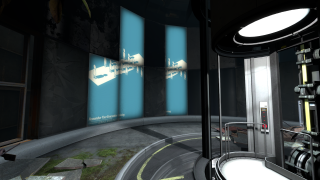vgui_movie_display
| CMovieDisplay |
movie_display.cpp
|
vgui_movie_display is a point entity available in all ![]() Source games since
Source games since ![]() Alien Swarm. (also in
Alien Swarm. (also in ![]() )
)

vgui_movie_display on elevator screens in portal2\media\exercises_horiz.bik.This entity is used to display videos in the world. ![]() Portal 2 uses the Bink format for videos, while
Portal 2 uses the Bink format for videos, while ![]() Portal 2: Community Edition (along with all Strata Source games) uses the WebM format.
Portal 2: Community Edition (along with all Strata Source games) uses the WebM format.
A movie screen is typically a brush face textured with elevator/elevator_screen or one of its variants. Make sure you click "Fit" in the Texture Application Tool.
Stretching movies across multiple screens
The master/slave keyvalues and U/V inputs on the entity can be used to stretch a movie across multiple displays. The usual setup for this involves one vgui_movie_display with "_master" at the end of its targetname, which then controls a group of slave vgui_movie_displays that have "Forced Slave" enabled and the same "Group Name" as the master entity.
Place a slave vgui_movie_display for each screen at the lower-left corner of the face. Change the width and height to match each panel. The U/V inputs can be used to set which part of the image is displayed on each screen.
To start the movie, fire an "Enable" input at all vgui_movie_display entities; wildcards are useful for this.
Elevator videos
Valve includes a system for selecting elevator videos in custom maps. The arrival_departure_transition_ents instance includes a pair of instance parameters which can be used to set the arrival and departure videos respectively. The video_splitter.nut VScript will automatically handle setting the correct U/Vs.
Unfortunately, the default instances included in Portal 2 have broken elevator videos since the Perpetual Testing Initiative update. To fix, visit this steam guide.
Property Name Value Fix up Name VMF Filename instances/transitions/arrival_departure_transition_ents.vmf Replace $arrival_video media/faithplate.bik Replace $departure_video media/animalking.bik
The video_splitter script also contains a list of all singleplayer campaign maps and which videos each map should play. For mods, it is recommended to add the mod's maps to this list. Single maps should continue to use the method above.
Keyvalues
- Name
(targetname)<string> - The name that other entities refer to this entity by, via Inputs/Outputs or other keyvalues (e.g.
parentnameortarget).
Also displayed in Hammer's 2D views and Entity Report.See also: Generic Keyvalues, Inputs and Outputs available to all entities
- Display Text
(displaytext)<string> - Unknown use, appears non-functional.
- Movie Filename
(moviefilename)<string> - Path to the video file, located in media/. Portal 2 uses Bink (.bik) videos, while P2CE uses WebM (.webm) videos. See List of Portal 2 Movies for a list of default videos in Portal 2 (P2CE also includes WebM versions of these).
- Group Name
(groupname)<string> - What group of vgui_movie_display entities it belongs to.
- Loop Movie
(looping)<boolean> - If true, the movie will be played in an endless loop.
- Mute Movie
([todo internal name (i)])<boolean> (only in )
) - If true, it will mute the movie.
- Stretch to Fill
(stretch)<boolean> (in all games since )
) - If true, will resize the movie to fill the screen.
- Forced slave
(forcedslave)<boolean> (in all games since )
) - Whether this is a "slave" vgui_movie_display that takes command from the master.
- Force precache
(forceprecache)<boolean> (only in )
) - Precache the movie referred to by Movie Filename on entity spawn.
- Panel width
(width)<integer> - Width of the panel in units.
- Panel height
(height)<integer> - Height of the panel in units.
- Disable Scanline Overlay
(noscanline)<boolean> (only in )
) - Enables/Disables the scanline overlay.
- Use Custom UVs
(custom_uv)<boolean> (only in )
) - Same as SetUseCustomUVs input, just as a keyvalue
- U Min
(u_min)<float> (only in )
) - U (horizontal) minimum (0-1)
- U Max
(u_max)<float> (only in )
) - U (horizontal) maximum (0-1)
- V Min
(v_min)<float> (only in )
) - V (vertical) minimum (0-1)
- V Max
(v_max)<float> (only in )
) - V (vertical) maximum (0-1)
- Audio Volume
(volume)<integer> (only in )
) - Audio volume to use for video playback (0-10)
Inputs
Enable- Make movie visible.
Disable- Make movie invisible.
SetDisplayText<string>- Sets the display text. Appears non-functional.
SetMovie<string> (in all games since )
)- Sets the movie to display.
SetUseCustomUVs<boolean> (in all games since )
)- Use custom UVs.
SetUMin<float> (in all games since )
)- Set the minimum U.
SetUMax<float> (in all games since )
)- Set the maximum U.
SetVMin<float> (in all games since )
)- Set the minimum V.
SetVMax<float> (in all games since )
)- Set the maximum V.